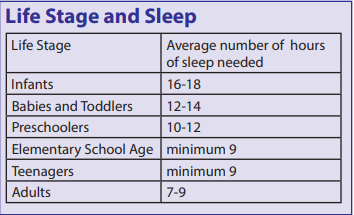A Better You Through Better Sleep
Return to Heath and Nutrition Agent Articles

It is the start of the new year so that means for many people it is the start of their new year’s resolutions or new goals. The top theme for new year’s resolutions are around healthier lifestyles. These typically encompass something along the lines of eat better, lose weight, more physical activity, less stress, and quit smoking.
One health behavior that may not be considered for someone’s new year’s resolution is sleep. Who doesn’t love sleep?! Most adults need 7 to 9 hours of quality sleep a night, but the average American gets less than 7 hours a sleep a night. Children and teens need anywhere from 9 to 18 hours depending on their stage of life. The average amount of sleep for teenagers is about 7 hours which is well below the minimum 9 hours needed. Both quality and quantity of sleep are important and despite popular belief, trying to make up lost sleep on a weekend does not erase a person’s sleep deficit.
So why is it so important to get enough sleep? Sleep is important for good health and benefits your brain, mood, immune system, heart, gut, weight, hormones, and repairs and restores cells. Research has shown that individuals who do not get adequate sleep have higher risk of obesity and chronic diseases like diabetes and high blood pressure, depression, and have poor attention or memory. Not getting enough sleep can trigger the body to release adrenaline, cortisol, and other stress hormones which contribute to obesity and chronic disease and can cause chronic inflammation in the body.
Now that you are sold on your new year’s resolution is to get better sleep let’s discuss some tips for making sure you get a good night’s sleep.
Develop a sleep schedule and stick to it! This means going to bed and waking up at the same time each day, even on the weekends.
Be physically active every day, but not too close to your bedtime. Aim for 30 minutes of physical activity, like walking, most days of the week. Do not do intense physical activity at least 3-4 hours before bed.
Avoid caffeine late in the day. The effects of caffeine can sometimes last up to 8 hours before they wear off.
Avoid alcohol before bed. Consuming alcohol before bed disrupts your REM (rapid eye movement) cycle.
Set up a good sleep environment. Keep your room cool, dark, and quiet. A television, your phone or computer can be a distraction and emit blue light than disrupts your sleep.
And finally,
Do not lie awake in bed if you cannot fall asleep. This will only add to your stress and anxiety of not being able to sleep. If you are awake for more than 20 minutes in bed, go ahead and get up and go read a book, take a hot bath, or another relaxing activity until you feel sleepy. Try not to use electronics that as that may make it harder to become tired and fall asleep. Binge watching your favorite show when you cannot fall asleep won’t help you get back to sleep!
There are several sleep disorders that may cause poor sleep such as insomnia, snoring and sleep apnea, and restless leg syndrome. If you do not get quality sleep on a regular basis and you have tried several methods to improve your sleep, speak with your healthcare provider for a thorough health and sleep assessment.
Want more great food tips, recipes and nutrition info?
Sign up to receive In Good Health each month in your email inbox.
Back to Agent Articles